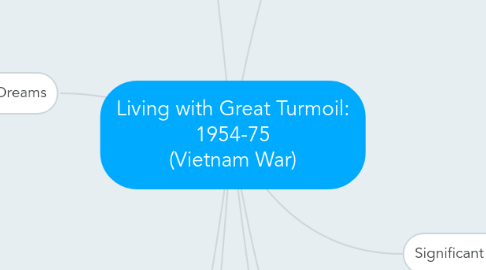
1. Unpinned
1.1. 1. In 1964, three civil rights workers, Michael Schwerner, Andrew Goodman and James Chaney were murdered. How did their murder help to mobilize the Civil Rights Movement?
1.2. 2. The era of student protest began at University of California, Berkeley. What prompted these student protests?
1.3. 3. How and why did the United States get involved in the Vietnam War?
1.4. 4. Why was the Vietnam War different than any other type of war previously fought by the United States?
1.5. 5. In the mid-1960s, the Civil Rights Movement began to splinter into separate factions. Why did this happen?
1.6. 6. Compare the ideologies and techniques of Martin Luther King, Jr. and Malcolm X.
1.7. 7. How was the counterculture symbolic of the generational conflicts in America in the 1960s?
1.8. 8. The actions of the Women’s Liberation Movement broke many of the gender boundaries and taboos of earlier eras. How did the Civil Rights Movement influence this movement?
1.9. 9. Discuss the role of television in the coverage of the Vietnam War.
1.10. 10. What would suggest that the Vietnam War heightened class antagonism?
2. Poisoned Dreams
2.1. 1. In 1960, in Greensboro, North Carolina, young African-American students demonstrated against segregation by sitting at luncheon counters that only served white patrons. How could young African-Americans be “freed” by being arrested and put in jail?
2.2. 2. The early 1960s were unique in that it was truly a youth culture. Discuss some ways in which this is evident.
2.3. 3. What is a “cold warrior?” How were both John F. Kennedy and Richard Nixon cold warriors?
2.4. 4. John F. Kennedy was one of America’s most popular presidents. Why was JKF so popular? What was his special appeal?
2.5. 5. Discuss the role of television in the 1960 presidential election.
2.6. 6. Why did the Soviet Union erect the Berlin Wall?
2.7. 7. Who were the Freedom Riders? What were their objectives? How are they true American heroes?
2.8. 8. What is the “domino theory?” How did the US address this?
2.9. 9. Discuss the power of song in the Civil Rights Movement of the 1960s.
2.10. 10. How did JFK’s death affect America? Why was his assassination the day America “lost its innocence?”
3. Issues
3.1. Opposition to U.S. Involvement
3.1.1. Media
3.1.1.1. Woodstock
3.1.1.2. Protest Music
3.1.1.3. Television
3.1.2. The People
3.1.2.1. Students
3.1.2.1.1. Campus Unrest
3.1.2.2. Soldiers
3.1.2.3. Public Opinion
3.1.2.3.1. Draft Evasion
3.2. Military Issues
3.2.1. Commitment
3.2.2. Lack of Experience
3.2.3. Asymmetric Warfare
3.2.3.1. Guerrilla Warfare
3.2.3.2. Strategy
4. Legacy
4.1. Long-Term
4.1.1. Military
4.1.2. Economic
4.1.3. Health
4.2. Short-Term
4.2.1. Casualties
4.2.2. Economic
4.2.3. Social
5. Context
5.1. Time
5.2. Place
5.2.1. South/North Vietnam
5.2.2. Cambodia
5.2.3. Laos
5.3. Circumstances
5.3.1. America joined against Communism
5.3.2. U.S. and USSR fought for spheres of influence.
5.3.2.1. proxy war
5.3.3. Precursors to War
5.3.3.1. Containment
5.3.3.2. Domino Theory
5.4. Result
5.4.1. North Vietnamese victory
5.5. also known as
5.5.1. Second Indochina War
5.5.2. America's longest war/only war "lost"
5.5.3. Resistance War Against America
5.5.4. American War
5.6. Players
5.6.1. South Vietnam + America
5.6.2. North Vietnam + Soviet Union
6. Significant Events
6.1. Tet Offensive (1968)
6.1.1. Impact
6.1.1.1. Casulaties.
6.1.1.1.1. 1968 was one of the deadliest years of the war
6.1.1.2. President Johnson said he would limit the bombing of North Vietnam to the area below the 20th parallel (this would spare 90% of Communist territory). He also called for negotiations to end the war.
6.1.2. Background
6.1.2.1. United States
6.1.2.2. North Vietnam
6.1.3. Leaders
6.1.3.1. Vo Nguyen Giap
6.1.3.1.1. He planned the Tet Offensive to provoke rebellion among the South Vietnamese population and to encourage the U.S. to scale back its support of the Saigon regime.
6.1.4. The Battle of Hue
7. Significant Figures
7.1. Vietnam
7.1.1. Ho Chi Minh
7.1.2. Ngo Dinh Diem
7.2. U.S.
7.2.1. Dwight D. Eisenhower
7.2.1.1. John F. Kennedy
7.2.2. Lyndon B. Johnson
7.2.2.1. Richard Nixon
